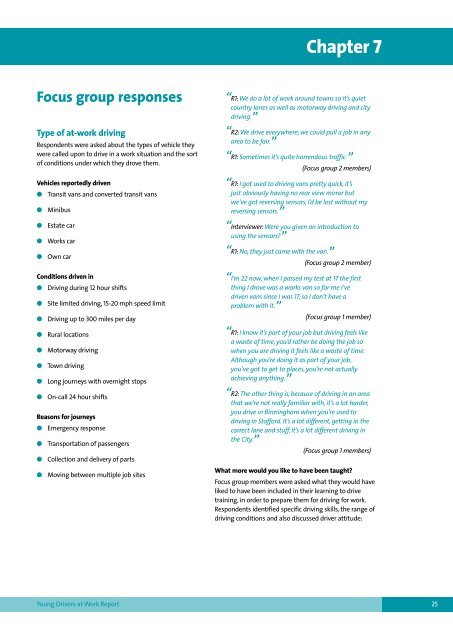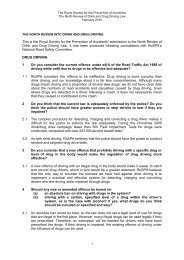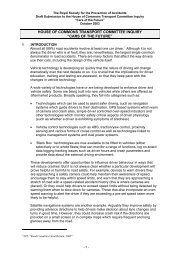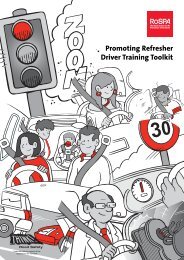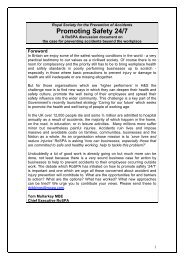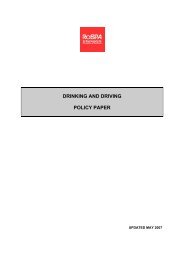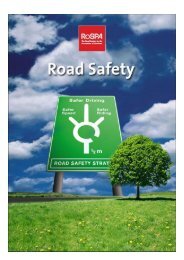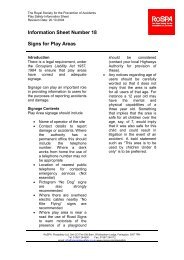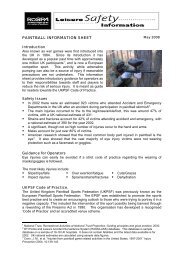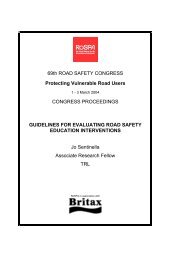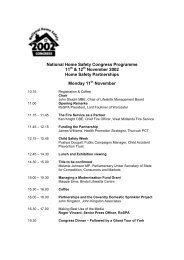RoSPA Young Drivers at Work Report
RoSPA Young Drivers at Work Report
RoSPA Young Drivers at Work Report
Create successful ePaper yourself
Turn your PDF publications into a flip-book with our unique Google optimized e-Paper software.
Chapter 7<br />
Focus group responses<br />
Type of <strong>at</strong>-work driving<br />
Respondents were asked about the types of vehicle they<br />
were called upon to drive in a work situ<strong>at</strong>ion and the sort<br />
of conditions under which they drove them.<br />
Vehicles reportedly driven<br />
● Transit vans and converted transit vans<br />
●<br />
Minibus<br />
“R1:We do a lot of work around towns so it’s quiet<br />
country lanes as well as motorway driving and city<br />
driving. ”<br />
“R2:We drive everywhere; we could pull a job in any<br />
area to be fair. ”<br />
“R1: Sometimes it’s quite horrendous traffic. ”<br />
(Focus group 2 members)<br />
“R1: I got used to driving vans pretty quick, it’s<br />
just obviously having no rear view mirror but<br />
we’ve got reversing sensors, I’d be lost without my<br />
reversing sensors. ”<br />
●<br />
●<br />
●<br />
Est<strong>at</strong>e car<br />
<strong>Work</strong>s car<br />
Own car<br />
“Interviewer:Were you given an introduction to<br />
using the sensors? ”<br />
“R1: No, they just came with the van. ”<br />
(Focus group 2 member)<br />
Conditions driven in<br />
● Driving during 12 hour shifts<br />
● Site limited driving, 15-20 mph speed limit<br />
● Driving up to 300 miles per day<br />
● Rural loc<strong>at</strong>ions<br />
● Motorway driving<br />
● Town driving<br />
● Long journeys with overnight stops<br />
● On-call 24 hour shifts<br />
Reasons for journeys<br />
● Emergency response<br />
● Transport<strong>at</strong>ion of passengers<br />
● Collection and delivery of parts<br />
● Moving between multiple job sites<br />
“I’m 22 now, when I passed my test <strong>at</strong> 17 the first<br />
thing I drove was a works van so for me I’ve<br />
driven vans since I was 17, so I don’t have a<br />
problem with it. ”<br />
(Focus group 1 member)<br />
“R1: I know it’s part of your job but driving feels like<br />
a waste of time, you’d r<strong>at</strong>her be doing the job so<br />
when you are driving it feels like a waste of time.<br />
Although you’re doing it as part of your job,<br />
you’ve got to get to places, you’re not actually<br />
achieving anything. ”<br />
“R2:The other thing is, because of driving in an area<br />
th<strong>at</strong> we’re not really familiar with, it’s a lot harder,<br />
you drive in Birmingham when you’re used to<br />
driving in Stafford. It’s a lot different, getting in the<br />
correct lane and stuff, it’s a lot different driving in<br />
the City. ”<br />
(Focus group 1 members)<br />
Wh<strong>at</strong> more would you like to have been taught?<br />
Focus group members were asked wh<strong>at</strong> they would have<br />
liked to have been included in their learning to drive<br />
training, in order to prepare them for driving for work.<br />
Respondents identified specific driving skills, the range of<br />
driving conditions and also discussed driver <strong>at</strong>titude:<br />
<strong>Young</strong> <strong>Drivers</strong> <strong>at</strong> <strong>Work</strong> <strong>Report</strong><br />
25


